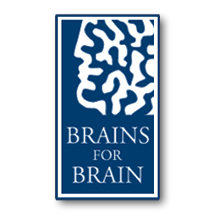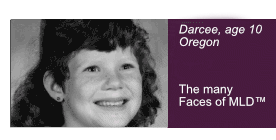European Task Force on Brain and Neurodegenerative Lysosomal Storage Diseases
BRAINS FOR BRAIN – MLD CORE PROJECT
The MLD Core consists of 8 independent but integrated projects. This MLD-specific research is under the guidance of leading European experts in their own labs. The projects focus on basic science and natural history to provide a solid platform to create and improve therapies, including enzyme replacement, gene therapy, hematopoietic and neural stem cell transplantation, and substrate reduction therapy.
The projects are coupled in that the science developed in one can be tested in another.
Click here to see a video interview with Dr. Scarpa & Dr. Begley, co-founders of Brains for Brain
The MLD Core projects are significantly funded by the Brains for Brain Foundation (Italy) which was generously provided an initial grant to study MLD. This grant will cover about 70% of the MLD Core research.
MLD Foundation is a collaborator and key advocate for funding the MLD Core...
"This is the only organized multi-center MLD-specific research currently underway (2010). A key aspect of this research is the focus on the basic science of ARSA transport across the blood brain barrier" said Dean Suhr, President of MLD Foundation. "While MLD often benefits from other lysosomal disease research, this time MLD is leading the charge on the research and other lysosomal and neurodegenerative diseases are beneficiaries. MLD Foundation intends to put significant effort into funding the balance of the MLD Core through 2011, and as necessary, beyond."

Key Focus – Blood Brain Barrier
Currently drugs and therapies such as Enzyme Replacement Therapy and Stem Cell Transplants are not as effective as we wish they were because they do not efficiently cross through the blood-brain barrier (BBB) to reach the central and peripheral nervous systems. Therefore, a unified focus of the Brains for Brain research is to develop innovative therapeutic strategies to efficiently cross the blood-brain barrier.
MLD Core Project Summaries – Three Focus Areas
CLINICAL HISTORY
Natural History – an international epidemiological survey and description of the natural course of metachromatic leukodystrophy during childhood and adolescence.
MECHANISMS OF ENZYME REPLACEMENT THERAPY
Absorption of ARSA across the BBB - in vitro (lab) experiments to characterize the receptors and the mechanism responsible for endothelial cells absorption and effective transfer of the Arylsulfatase A enzyme
ARSA and BBB Animal Studies – in vivo (animal) studies of nanopartical vectors to get recombinant human enzyme ASA (rhASA) across the BBB
Fusion Peptides – the use of fusion peptides (another carrier) to facilitate ARSA crossing the BBB.
Diverse nanopartical to facilitate BBB crossing – develop and employ diverse nanoparticles made of different polymeric materials and verify the efficiency and biocompatibility.
THERAPIES
Cerebroside Transferase Enzyme (CST) – Research and develop, by means of transgenic mice, the inactivation of CST for the substrate reduction therapy.
Neural Stem Cells – animal model investigations into the use of neural stem cell both a therapy for MLD and to repair the nerve damage caused by a genetic enzyme deficiency and the resulting accumulation of substrate characteristic of MLD.
Gene Therapy with HSCT – research and clinical trials using hematopoietic stem cell gene therapy to cross correct the ARSA deficiency by manipulation with therapeutic viral vectors and an autologous transplant.
more info here
Brains for Brain Collaborative
The Mission of Brains for Brain is to catalyze research in the field of neurodegeneration and lysosomal diseases. Established March 2007, the Brains for Brain collaborative consists of over 85 distinguished scientists and clinicians working together to create and coordinate effort towards the comprehension of the pathophysiology processes of neurological disorders occurring in lysosomal disease.
The implementation of knowledge of blood brain barrier function and the development of new molecular and or biochemical strategies to overcome the blood brain barrier and treat neurological disorders is a central part of the effort. The achievement of these targets will allow the development of new approaches for therapy of the neurological complications of lysosomal disease patients.
The MLD Core projects are focused on MLD, but will also benefit other lysosomal disease and and neurological diseases, such as Gaucher, Hunter, MPS, Krabbe, Parkinson's, Alzheimer's, Multiple Sclerosis and Amyotrophic Lateral Sclerosis.
Four major Biotech Companies – Actelion, Biomarin, Genzyme, and Shire Human Genetic Therapies – initially helped to fund Brains for Brain. The consortium coordinates and collaborates strongly with the European Study Group for LSD (ESGLD), and the Global Organization for Lysosomal Disorders (GOLD), of which most of the Brains for Brain associates are members. They are also engaged in the European FP7 Health Program and are working to include US NIH projects and funding.
CONTACTS
To learn more about B4B please see http://www.brains4brain.eu/site/home_en.html
MLD CORE PROJECT BUDGET
| Core Project |
2 Year Budget |
| 1 - Natural History |
€110,000 |
| 2 - ARSA transcytosis across BBB |
111,000 |
| 3 - ARSA transport at the BBB |
134,382 |
| 4 - Using peptides to bypass BBB |
80,000 |
| 5 - Nanoparticles to deliver ARSA |
115,000 |
| 6 - Inhibitors of cerebroside-sulfotransferase |
115,000 |
| 7 - Neural stem cell treatment for MLD |
120,000 |
| 8 - Hematopoietic stem cell gene therapy for MLD |
80,000 |
| TOTAL 2-YEAR PROJECT BUDGET |
€865.382 |
| Brains for Brain Foundation commitment* |
600.000 |
| Fundraising Underway |
€265.382** |
* The Brains For Brain Foundation has already contributed €600,000 to the MLD Core Project and is looking to other forms of collaborations to fulfill the balance of the project budget.
** € 265.382 is approximately $350,000 US
QUICK LINKS
 Donate now to help fund this MLD-specific research. Donate now to help fund this MLD-specific research.
Click here to see a video interview with Dr. Scarpa & Dr. Begley, co-founders of Brains for Brain
Conversations about MLD™ with Dr. Scarpa <coming soon>.
MLD Core Project Overview document
- March 2010
|





